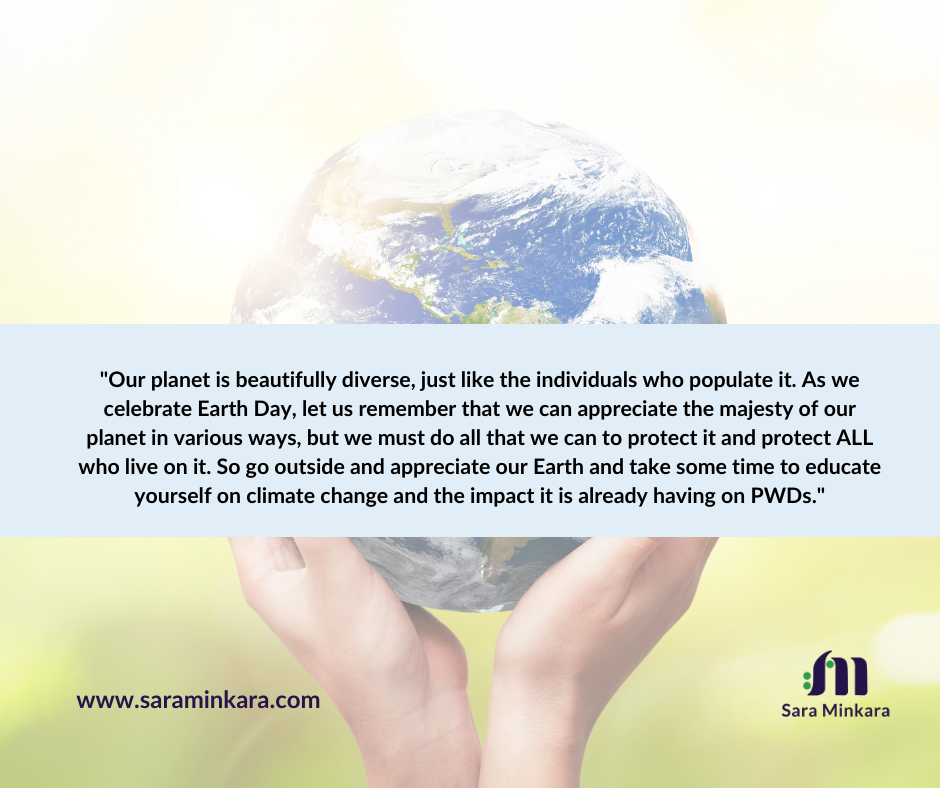How People with Disabilities are Disproportionately Impacted by Climate Change
How do you appreciate a sunrise? Sure, you can witness the dazzling colors painted across the sky as the sun peaks above the horizon, but have you ever closed your eyes to feel the dawn as the sun begins to warm your face? There are so many wonderful and unique ways to appreciate the majesty of our planet, and as we celebrate Earth Day, I challenge you to experience it in conventional and unconventional ways.
Since 1970, Americans have celebrated Earth Day on April 22 and are reminded of the importance of protecting our beautiful planet that supports so much diversity in life.
We have all heard the research and are aware of climate change, but all too often, we consider this looming threat as someone else’s problem that will impact others… in another place… at another time. While these changes may not be happening overnight, they are happening and impacting everyone.
The challenge? This crisis WILL impact everyone, but WILL present tougher challenges for those who have been forgotten within our vast and diverse society, including people with disabilities.
PWDs make up about 15% of the entire world’s population. Due to socioeconomic factors, marginalization, and discrimination, people with disabilities are likely to experience the effects of climate change more intensely in three ways: knowledge, vulnerability, and evacuation.
Let’s start with knowledge. Due to the issue of marginalization, disabled populations are less likely to have access to knowledge, resources, and education. According to the UNEP, “90% of children with disabilities in developing countries do not attend school, and the global literacy rate for adults with disabilities is as low as 3 percent.” We must create a more accessible education system to educate people with disabilities, and in turn to ensure everyone is equally aware, prepared, and ready for extreme climate changes.
Secondly, some PWDs have compromised immune systems that make them more vulnerable to complications that come with climate change such as infectious diseases and ecosystem loss. (United Nations Environment Programme) For example, reduced air quality might be uncomfortable for most, but it could be fatal for someone with underlying conditions.
Finally, extreme weather brought on by climate change often leads to increased migration to safer areas not as impacted. Migrating or relocating requires resources, knowledge, and mobility. See the trend? Marginalized groups maybe unable to travel in an effort to escape a harmful environment and be forced to remain in deteriorating conditions without access to support, jobs, food, medical services, or even housing.(Human Rights Watch) One simple example is emergency or extreme weather advisories that are not fully accessible, let alone evacuation plans or post-disaster recovery plans.
Our planet is beautifully diverse, just like the individuals who populate it. As we celebrate Earth Day, let us remember that we can appreciate the majesty of our planet in various ways, but we must do all that we can to protect it and protect ALL who live on it. So go outside and appreciate our Earth and take some time to educate yourself on climate change and the impact it is already having on PWDs.
Here are some resources to educate yourself on climate change:
• https://advances.sciencemag.org/content/1/5/e1400253.full
•https://www.nrdc.org/stories/global-climate-change-what-you-need-know
• https://climate.nasa.gov/
• Seaspiracy- Netflix
• Our Planet- Netflix
Read more about climate change impacts PWDs:
•https://www.unep.org/news-and-stories/story/how-climate-change-disproportionately-impacts-those-disabilities
•https://www.un.org/development/desa/disabilities/resources/factsheet-on-persons-with-disabilities.html
•https://www.un.org/development/desa/disabilities/publication-disability-sdgs.html
•https://www.hrw.org/news/2020/05/28/people-disabilities-needed-fight-against-climate-change#
•https://www.cmu.edu/steinbrenner/EPA%20Factsheets/disabilities-health-climate-change.pdf


